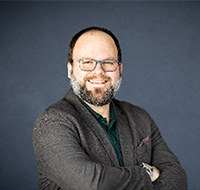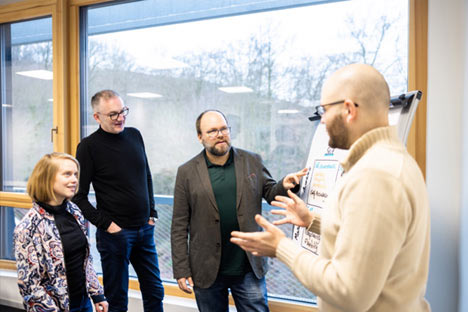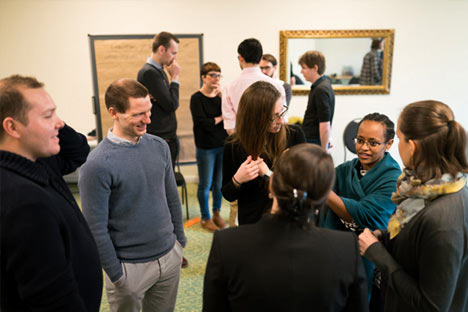Overseas Case: EMBO Solutions (Germany)
Empowering Future Leaders: EMBO Solutions’ Initiatives for Researcher Development
The leaders of tomorrow are being trained today. The training courses offered to scientists by universities and institutes naturally focuses on scientific and research skills, but do not always equip them with the leadership skills they will need as they advance in their careers. Through its daughter company, EMBO Solutions, EMBO offers several training courses to bridge this knowledge gap with the overarching aim of holistic empowerment. In this article, we explore the various initiatives undertaken by EMBO Solutions, in conversation with Dr. Samuel Krahl, the Head of Training at EMBO Solutions.
Abstract
The European Molecular Biology Organization (EMBO) is a professional, non-profit organization that promotes excellence in life sciences through a programme of grants and fellowships for individuals and financial support for scientific meetings.
EMBO Solutions is an EMBO wholly-owned, not-for-profit daughter company that supports excellence by offering a variety of training courses that cater to early- and mid-career researchers, covering myriad subjects, such as skill-development for efficient leadership and communication.
Interviewee’s Bio

Dr. Samuel Krahl is the Head of Training at EMBO Solutions, a daughter company of EMBO. Dr. Krahl pursued his PhD in molecular biology and biochemistry at the University of East Anglia, Norwich, England, working on the inositol phosphate kinases that generate phytic acid and its intermediates. Searching for alternate research-related careers, he became the Assistant Editor of the Science & Society Section of EMBO Reports, a scientific journal published by EMBO. In 2016, Dr. Krahl transitioned from editorial work and journal project management to delivering soft skills training for scientists. He now leads the training team at EMBO Solutions. He has been associated with the organization for 16 years.
EMBO’s mission: Supporting and promoting excellence in life sciences
EMBO receives funding from a number of member states, which it utilizes to the benefit of life science scholars, researchers, and scientists. These initiatives and support activities range from providing fellowships and grants, to funding seminars and meetings.
Among these various initiatives, the EMBO Young Investigator Programme, which supports young group leaders just beginning their leadership careers, is an excellent example of how EMBO facilitates researcher empowerment. While the grant eligibility criteria require individuals to have already established a laboratory or research group of their own, EMBO provides additional funds to grow their network. “In my view, EMBO is fundamentally investing in people to achieve great things for life science research,” says Dr. Krahl.
The training offered by EMBO Solutions to senior postdocs and group leaders also supports this focus on individuals. Dr. Krahl and his team, as well as freelance facilitators supplied by the German consultancy firm Leadership Sculptor, cover a wide variety of soft skills topics centered around leadership, addressing challenges ranging from dealing with demotivated PhD students to addressing conflict situations within research groups. EMBO Solutions trainers, as well as EMBO Press editors, also offer scientific skills training for PhD students and junior postdocs, developed to address topics like research integrity and scientific communication.
A significant advantage to Dr. Krahl and his team is their access to active researchers through EMBO and their training courses, from whom they learn much about the challenges scientists are facing day-to-day in their work. This allows EMBO Solutions to continuously develop and refine its training courses to ensure that EMBO is meeting the needs of scientists.
EMBO Solutions: Helping makes research more productive, inclusive, and fairer
Dr. Gerlind Wallon, the head of the Young Investigator Programme, initiated the EMBO Laboratory Leadership Courses in 2004/5 in response to the needs of leaders in that programme. The course was developed in collaboration primarily with Dr. CJ Fitzsimons, who heads Leadership Sculptor.
Since around 2009, EMBO Solutions, the daughter company of EMBO, has been responsible for the delivery of these courses, with the courses being available to scientists worldwide, irrespective of whether they are funded by EMBO.
EMBO Solutions itself was originally founded to manage the organization of the EMBO Meeting, an annual European congress for life science researchers that ran between 2009 and 2016. Over time, and especially since the EMBO Meeting programme was discontinued, EMBO Solutions has grown to focus specifically on the delivery of the EMBO Laboratory Leadership and Scientific Skills Courses. Having an entire team dedicated to training has allowed the initiative to achieve greater reach and impact. Dr. Krahl’s team employs three full-time trainers, and the collaboration with both the EMBO Press editors and Leadership Sculptor’s team of freelance trainers from around the world continues to bring a variety of skills, perspectives, and expertise to the EMBO Training portfolio.
EMBO’s leadership courses: Specifics, facts, and figures

EMBO aims to empower scientists to become effective leaders through a variety of courses and initiatives (Image courtesy: Shutterstock)
EMBO’s Laboratory Leadership Courses are designed for small groups of around 16 people to ensure that they are highly interactive and maintain an effective facilitator to participant ratio. The courses are run with valuable inputs from both the facilitators and participants, through robust engagement and a plethora of activities.
Each year, EMBO Solutions organizes around 24 leadership courses to take place over 3 or 4 days, for postdocs and group leaders respectively, that are hosted at a hotel near Heidelberg in Germany. These courses are open for registration to all scientists at the relevant career stages. In addition to these open registration courses, around 20 to 30 additional closed registration courses are delivered at institutes worldwide for their research teams on request. The courses are run with a global perspective and invite participation from European Union countries like Germany, Italy, Spain, and France, alongside the United Kingdom, the United States of America, and Asian countries like India and Japan. Presently, EMBO Solutions works with around 900–1,000 participants each year.
The majority of courses run in person on location, but the onset of COVID led EMBO Solutions, Leadership Sculptor, and the EMBO Press editors to develop online versions of the courses, which continue to be offered as part of the EMBO Training portfolio. The continued provision of online training is important to Dr. Krahl and his team, as it allows individuals who cannot or do not wish to travel or be away from home to attend.
The development of the online versions took around six months, and the courses replicate the style, length, and format of the originals, albeit taking place live in a digital environment, rather than a physical one.
Dr. Krahl remarks that the essence of both the online and offline courses is in “bringing people together in a space to learn, share, and connect with each other as peers.” While there are a few limitations to the social aspect of the courses in the online versions, the efficacy of the material and content remains the same.
Laboratory Leadership Courses: The ultimate goal
EMBO works towards a long-term mission of supporting excellence in life sciences. In line with that mission, “EMBO runs these courses because it wants to put scientists in the best position possible to do excellent work,” says Dr. Krahl.
In recent times, there has been global acceptance that good leadership drives good research and valuable results. “Leadership is challenging, and can be isolating and lonely, which makes those challenges difficult to talk about,” says Dr. Krahl. His team thus works to support scientists in leadership positions and to provide them with the tools and skills needed to deliver great research, while also taking care of their people and themselves. They work with an objective of making wonderful leaders out of wonderful human beings. This urge to help people and make their experience in scientific research better is part of what drives the EMBO Solutions team.
Lab leadership skills to accelerate career development

Dr. Krahl working with a group of people on the topic of Emotional Intelligence. The use of flipcharts allows participants to co-create the course and add their own experience and insight to the discussion and development of strategies (Image courtesy: EMBL Photolab)
Career development in scientific research is a holistic process, involving the gathering and sharing of knowledge alongside smart decisions, luck, and perseverance. There is no direct path to success in any field, and scientific research is no different. While some scientists forge a career in the lab, others go on to pursue equally valuable but separate niches in research-related roles, or leave academia and provide a scientific perspective in many diverse areas of work. However, the unifying thread between all these career development avenues is a thoughtful, rational perspective, a general curiosity to know about things and how they work, and diligence and dedication in pursuing the work at hand.
Through the EMBO Laboratory Leadership Courses, scientific investigators gain access to skills that help them work as integral members of any team, be it academic or otherwise. Effective communication and interaction are vital for success in any role. Even in academia, scientific research is not carried out in isolation. It involves groups of individuals in each laboratory, as well as collaborators extending across the country, or perhaps even the world. Hence, successful career development in science also entails cultivation of team-building and team-working aptitude. With career advancement, individuals in myriad industries find themselves in leadership roles at later stages of their career, where the ability to understand and lead a team becomes paramount.
Leaders must be able to not only establish a sync between all members of their research group, but also empower, support, and mentor them to be successful. The Laboratory Leadership Courses guide individuals on how to strike a balance between the two, effectively driving successful career development.
According to Dr. Krahl, many factors contribute towards leadership ability, and different leaders bring different important qualities to the table. Some of the common features that are identified by participants of the leadership courses include a high degree of empathy and emotional intelligence, a good memory, a willingness to listen, the ability to intuitively draw connections and create insights, and a scholarly focus on the subject matter at hand. The Laboratory Leadership Courses offer a chance to hone these skills and more, providing a space for shaping one’s aptitude for leadership roles.
EMBO Solutions: The team behind the leadership courses

The EMBO Solutions team works on the design and dissemination of leadership courses for early-career researchers (Image courtesy: Andreas Henn)
EMBO Solutions is a small but diverse team of individuals, all with research backgrounds. The team members contribute to the development and delivery of the courses, including by bringing in their different cultural and experiential perspectives. In addition, the wider Leadership Sculptor freelance trainer team draws on facilitators with expertise from a range of fields including business communication, coaching, organizational change, psychology, and negotiation. Dr. Krahl says that the blend of expertise behind the training and its development is valuable for bringing insight from a variety of fields into the research context. A particular challenge for the facilitators with non-research backgrounds has been to learn about what it is like to be a scientist working in a lab or coding at a computer. Through many years of working with scientists, as well as a memorable visit to the laboratories in Heidelberg, Germany, they have developed a deep awareness and understanding of the particular challenges facing life science researchers and can apply their expertise in life science research contexts.
The courses themselves are designed to draw even further on the range of expertise and experiences of everyone present on the course, not only the facilitators. “Around half of the content and insight on the course is provided by the facilitators. The other half comes from the researchers themselves, working together to solve each other’s challenges and sharing their experiences and advice. The facilitators learn just as much as the participants and every course is different,” says Dr. Krahl. To facilitate this, PowerPoint and standardized case studies are avoided, and instead the course is delivered on flipcharts and using the actual challenges the participants are facing to make the work as meaningful, empowering, and valuable as possible.
EMBO Laboratory Leadership Course for women
EMBO Solutions also offers a Self-Leadership Course, developed and delivered by Melissa Davies and Stéphanie Ruder Schoof at Negoservices. Half of these courses are available to all researchers, and half are restricted for registration by women only. The course itself was added to the EMBO Solutions portfolio after a particular need expressed by women researchers in the EMBO community, and the ‘women only’ courses continue to be provided as they allow the discussion of the challenges more commonly faced by women in research, or of common challenges that show up a little differently for women. Both versions of the course are identical in content and approach, and Dr. Krahl says that in an ideal world of equality and equal opportunity, a separate women’s course might not be needed. However, even with many equalizations coming into being, the likelihood that EMBO Solutions will stop offering the women-specific course is low for the foreseeable future.
All-round development as a means to success
Considering the rapid transformation in the communication landscape, with an increase in virtual interactions opening avenues for collaboration, people across industries are exploring new ways to advance their career through collaboration and networking. Skills that are considered ‘soft skills,’ such as communication, empathy, and conflict resolution, are actually as important as scientific competency and research aptitude, and EMBO Solutions helps individuals work on and refine these skills in a structured manner.
Through EMBO Solutions, EMBO aims to empower researchers with good leadership, research integrity, communication, and project management skills, all of which can have a meaningful impact on their careers, and all of which also help to ensure the well-being and happiness of them and the people they work with. The resulting benefit to research and society of healthy, fulfilled, and skillful individuals seems obvious. Thus, the all-round development of an individual further translates not only to better research, but to success in any career stream, be it academia, industry, or beyond.
Interview date: January 2023
Interview cooperation: Cactus Communications
